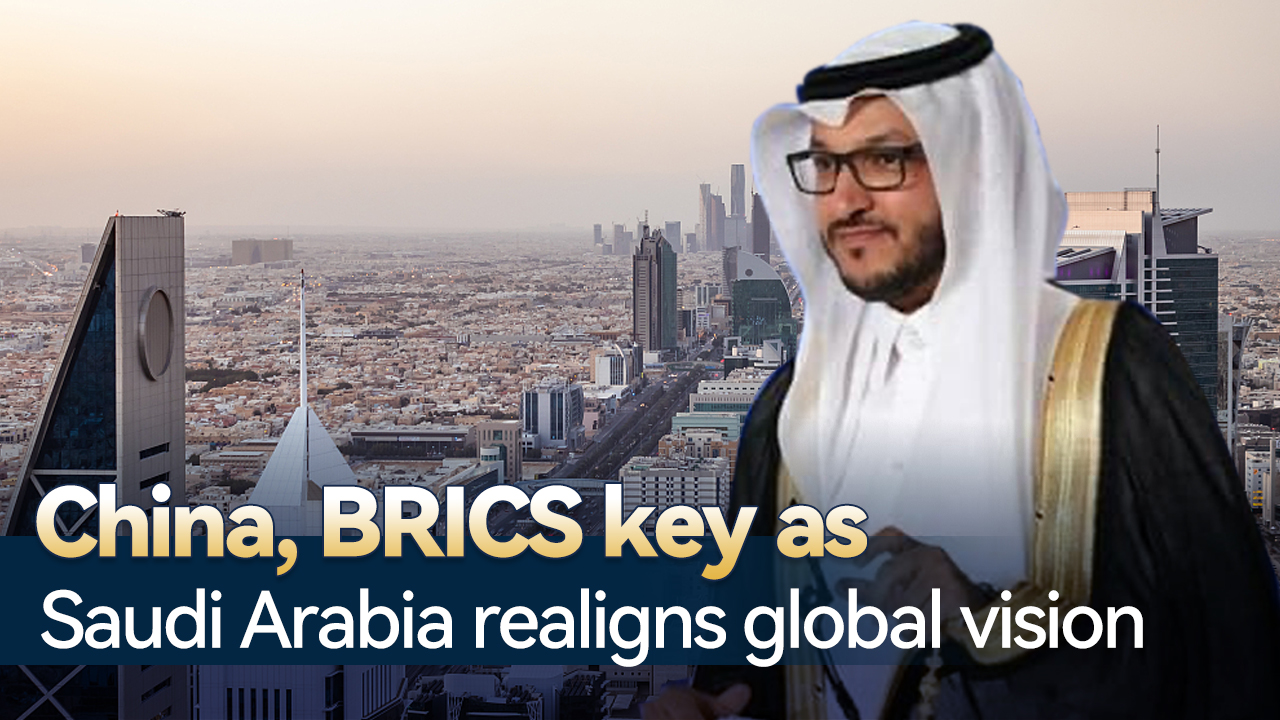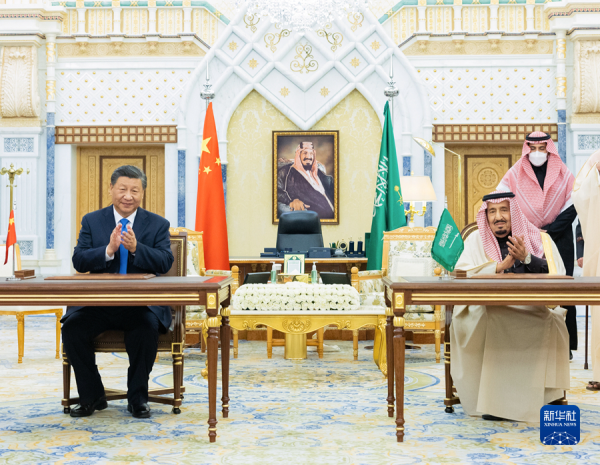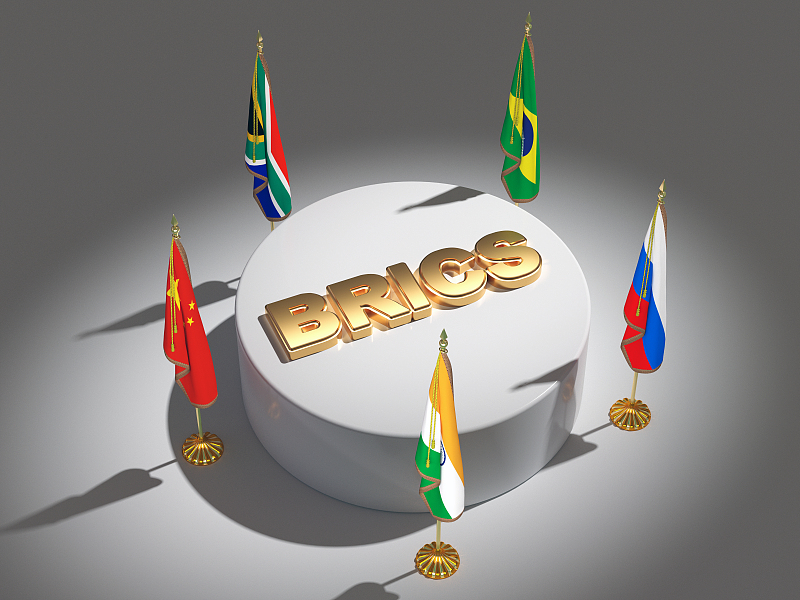04:07

Editor's note: Abhishek G Bhaya is a senior journalist and international affairs commentator. The article reflects the author's opinions and not necessarily the views of CGTN.
Saudi Arabia and the wider Arab world value their relationship with China as the region's biggest economic partner with Riyadh even contemplating joining the BRICS group of emerging economies as the Gulf Kingdom recalibrates its global vision amid shifting geopolitics and world order, according to Saudi political analyst and media commentator Salman Al-Ansari.
Al-Ansari, however, asserted that China's deepening ties with the Arab world, as amplified by President Xi Jinping's recent Saudi visit and high-powered summits with the Arab leaders, shouldn't be seen from the prism of a great power zero-sum game despite the United States' shrinking strategic presence in the region and the Saudi-U.S. relations facing certain tensions.
"It is indeed a fact that the Saudi-U.S. relationship is not at its best right now but the U.S. remains the kingdom's [and the region's] biggest security partner and China is the biggest economic partner," Al-Ansari pointed out in an interview via Zoom from Riyadh.
"The Kingdom is not interested in becoming a pawn on the chessboard [between world powers], but would remain a professional player," he said, adding that Saudi Arabia is committed to putting its own national interests above all. "The current world circumstances are different, and the Saudis are adjusting their global vision accordingly," noted Al-Ansari.
"Twenty years ago, China used to be the biggest trading partner of only 12 nations in the world. Today, it is the biggest trading partner of over 120 nations in the world, that is, 60 percent of all nations," he said explaining China's increasing global engagement. "So, it is indeed very important for Saudi Arabia and the Arab region to have strong relations with the Chinese nation," he reasoned.
Commitment for multilateralism

Chinese President Xi Jinping with Saudi King Salman bin Abdulaziz Al Saud during their meeting at Al-Yamamah Palace, Riyadh, Saudi Arabia, Debember 8, 2022. /Chinese Ministry of Foreign Affairs
Chinese President Xi Jinping with Saudi King Salman bin Abdulaziz Al Saud during their meeting at Al-Yamamah Palace, Riyadh, Saudi Arabia, Debember 8, 2022. /Chinese Ministry of Foreign Affairs
Related story: Xi's Saudi visit prompts optimism on future of China-Arab relations
Chinese President Xi Jinping on Saturday concluded a four-day eventful visit to Saudi Arabia that culminated with two "epoch-making" summits with Arab and Gulf Cooperation Council (GCC) leaders and a collective commitment to foster a closer China-Arab community with a shared future.
"The region is very optimistic about the prospect of the relationship between China and the Arab world. And it is indeed there are a lot of changes that are happening in the region and in the whole world when it comes to the world order," noted Al-Ansari.
Xi also held bilateral meetings with Saudi King Salman bin Abdulaziz Al Saud and Crown Prince and Prime Minister Mohammed bin Salman bin Abdulaziz Al Saud. Among many other issues, the two sides highlighted the importance of multilateralism and commitment towards a multi-polar world order.
In those meetings, the Chinese leader praised Riyadh's role as an important member of the Arab and Islamic world, while also lauding the Kingdom as a key and independent force in the multipolar world and China's important strategic partner in the Middle East.
"In recent years, China-Saudi Arabia relations have maintained high-level growth. The international and regional situation is undergoing profound and complex changes, making the strategic and overarching importance of China-Saudi Arabia relations more prominent," Xi remarked.
As both sides committed to stepping up communication and coordination at the UN and various other multilateral platforms, the Saudi Crown Prince extended his appreciation to China for supporting Saudi Arabia to become a dialogue partner of the Shanghai Cooperation Organization (SCO) and pledged to increase consultations with China at the G20 and BRICS.
Riyadh inches closer to BRICS

South Africa will chair the BRICS Summit in 2023 where the issue of expansion of the multilateral group, including the inclusion of Saudi Arabia, is expected to be discussed. /CFP
South Africa will chair the BRICS Summit in 2023 where the issue of expansion of the multilateral group, including the inclusion of Saudi Arabia, is expected to be discussed. /CFP
Related story: Gulf countries prioritize tech cooperation with China
Saudi Arabia has reportedly expressed an interest in joining BRICS. It was the South African President Cyril Ramaphosa who first revealed the kingdom's intention to join the bloc following his return from an official visit to Riyadh in mid-October, where he held talks with the Saudi Crown Prince Mohammed bin Salman.
The BRICS, as the acronym suggests, currently comprises five major non-Western emerging economies comprising Brazil, Russia, India, China and South Africa and accounts for nearly 42 percent of the world population, 27 percent of the land area, and 32 percent of global GDP (PPP).
South Africa will chair the BRICS Summit in 2023 where, according to reports, the issue of expansion of the multilateral group, including the inclusion of Saudi Arabia, is expected to be discussed. Other countries that have shown interest in joining the group include Turkey, Egypt, Argentina and Iran.
Al-Ansari said that it makes perfect sense for Saudi Arabia, as the largest economy in the Arab region, to explore the potential of becoming part of an expanded BRICS.
"BRICS nations are considered to be strong economic powers in the world. It represents nearly half of the world's population," he noted saying the group is "very important" for the Kingdom as it looks to diversify its economy and political relationships in line with its long-term vision.
Al-Ansari however cautioned that Riyadh's interest in a particular group should not be seen as an attempt to distance itself from other traditional allies, including the United States.
"We are not trying to join a specific group to be against another. Not at all," he asserted. "Saudi Arabia is committed to looking after its own national interests," Al-Ansari reiterated, stressing that Riyadh's outreach to BRICS is driven by its independent foreign policy and commitment to multilateralism.
Text and interviewer: Abhishek G Bhaya
Video editor: Keerqinfu
Cover image: Li Yueyun
Senior producers: Bi Jianlu, Zhang Peijin and Wang Xinyan
Chief editor: Li Shouen
(If you want to contribute and have specific expertise, please contact us at opinions@cgtn.com. Follow @thouse_opinions on Twitter to discover the latest commentaries on CGTN Opinion section.)